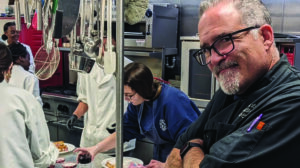In November, the U.S. Preventative Services Task Force released the results of its study on the efficacy of five breast cancer screening techniques – film mammography, clinical breast examination, breast self-examination, digital mammography and magnetic resonance imaging.The 2009 USPSTF study recommended against a routine screening mammography in women aged 40 to 49 years and recommended biennial screening in women aged 50 to 74.According to the study, “There is convincing evidence that screening with film mammography reduces breast cancer mortality, with a greater absolute reduction for women aged 50 to 74 years than for women aged 40 to 49 years. The strongest evidence for the greatest benefit is among women aged 60 to 69 years.”The 2009 study updates the 2002 USPSTF study recommending that screening begin at age 40, but the findings also included this statement: “The precise age at which the benefits from screening mammography justify the potential harms is a subjective judgment and should take into account patient preferences.”The 2009 USPSTF study notes that false-positive test results are a problem across all age groups but “false-positive test results are more common for women aged 40 to 49 years.”The study spawned controversy nationwide.Stacy Poore, executive director of the Susan G. Komen for the Cure in southeastern Colorado, said, “We have an organization full of experts who really do feel that the task force recommendations run counter to what we would encourage women to pay attention to.”Breast cancer is still a leading killer of women ages 40 to 60, not ages 50 to 60. We have a number of survivors who volunteer here or have friends and family members who were all diagnosed in their 40s, and it was discovered through a mammogram. We know it saves lives.””Every patient is unique, so how and when to screen for any given disease process must be individualized,” said Dr. Thomas Q. Davis, who recently retired as a doctor of internal medicine.”Recommendations for mass screening are based on statistics derived from a huge number of individual screenings. The physician seeing any given patient at any one time should be aware of the statistics but must also recognize he or she is seeing one person at that moment.”In the case of breast cancer, I’ve always found the key question to be ‘what would I do if this were my wife, sister or mother?’ Thus, in most cases, I would be inclined to follow the older guidelines.”The latest study also concluded that “radiation exposure, although a minor concern, is also a consideration.””As far as I know, there’s never been any proof that getting a mammogram, which is basically an X-ray, has been found to lead to anything,” said Joel Quevillon, communications manager for the American Cancer Society Colorado Springs office.According to the American College of Radiology and the Radiological Society of America, “The effective radiation dose from a mammogram … is about the same as the average person receives from background radiation in three months.”The 2009 USPSTF also found that teaching women to do breast self-exams does not reduce breast cancer mortality. The Web site of the Susan G. Komen organization lists a report about studies in China and Russia. “Trials found no difference in breast cancer deaths after 15 years between women who regularly self-examined and women who did not.”Instead of breast self-exam, the 2009 USPSTF study found that film mammography does the best job of screening for cancer. The study also found no evidence that digital mammography or MRIs of the breast have more benefit than film mammography.While still encouraging women to do breast self-exams, Susan G. Komen for the Cure advises women to be “breast self-aware … know what is normal for you … and report changes to your health care provider right away.””We know that mammography is not perfect, that it does have its flaws, but it’s the gold standard,” Poore said. “It’s the best that we have right now and until better technology can be introduced, we should use effectively that which we have.”
In Colorado, Women’s Wellness Connection (funded by the Colorado Department of Public Health and Environment and staffed by ACS volunteers) offers referrals for free mammograms and Pap tests to women between 40 and 64 who don’t have medical insurance and income below $2,200 per month: www.womenswellnessconnection.org or 866-951-9355.






